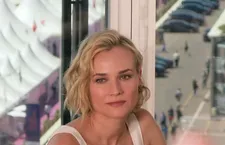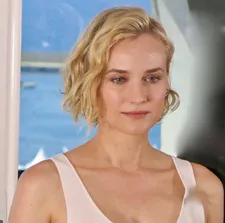.jpg_600.webp) |
| Diane Kruger atop the Majestic Hotel in Cannes Photo: Kering Women in Motion |
She could be compared to a cross between Grace Kelly and Carole Lombard. Diane Kruger, 38, who won best actress at the 70th Cannes Film Festival, has gone from being a top model to respected actress in a relatively short time. She intersperses big budget outings such as Troy and Inglourious Basterds with European films among them Alice Winocour’s Disorder; as Marie Antoinette in Benoit Jacquot’s Farewell, My Queen and Fabienne Berthaud’s Sky, about a contemporary French woman who strikes out on her own in the American West. She was a mainstay for two seasons in the American remake of the Scandi-noir series The Bridge, transposed to the border between the US and Mexico.
She speaks her native German for the first time in Cannes Competition entry In The Fade by German film-maker with Turkish roots Fatih Akin, playing a woman who takes revenge after her husband and son are murdered by a neo-Nazi group, the role which won her that best actress gong..
She was in conversation as part of the Kering Women in Motion series atop the Majestic Hotel in Cannes.
Q: So what took you so long to work in German ?
 |
| In the Fade star Diane Kruger: "I feel terribly concerned at the horrors we face every day and the uncertainty. I think it is a very relevant film, unfortunately.” Photo: Richard Mowe |
Diane Kruger: I was young, actually at the age of 15, and the family moved to Paris where I went to drama school and also I lived in the US for a long time. I do not know anyone in the film industry in Germany which is why it has taken all these years for me to work in German. It all happened in Cannes five years ago when I was on the jury. Fatih Akin had a documentary in the Festival and I went to his party as you can only do in Cannes and told him I much I loved his movies and that if he ever wanted to cast someone like me then he should remember me. And he did.
Q: Did you have to work with a dialogue coach or was your German good enough?
DK: No because it is my mother tongue, after all. It comes back very quickly. Fatih is from Hamburg and all his movies are shot in Hamburg so it has a very specific accent so I had to learn that a bit.
Q: The story of the film is about a woman who loses her son in a terrorist attack. What drew you to the story?
DK: I as motivated by her story because I think the world we live in has become accustomed to such attacks and we have stories such as what happened at the start of the week in Manchester. It has become a daily occurrence but you rarely hear about the people who are left behind and how they learn to live with such a terrible and unjust thing. I was really moved by her story. It is a movie about grief and justice and how to go on with such a terrible thing in your life.
Q: Did you prepare by talking to people who have survived attacks or reading about people involved in such atrocities?
DK: A little bit of both … it is based on a true story and it is an ongoing case in Germany. So I knew a lot already about what was happening with that. I spent a lot of time in Germany with the director and talking to women who have lost children and finding out about the steps of grief. A lot of it is instinct - as a woman losing a child is just so incomprehensible. Just living that grief for so long certainly made it the most challenging film I have done.
Q: How does it feel to go in to the première of the film in the wake of Manchester?
DK: My heart is beating fast and I feel terribly concerned at the horrors we face every day and the uncertainty. I think it is a very relevant film, unfortunately. The terror attack in the film is not motivated by religious extremism. What the movie is about is how we cope with that reality and that grief.
.jpg_225.webp) |
| Cannes star Diane Kruger admires the view from the top of the Majestic Hotel Photo: Kering Women in Motion |
Q: Does all the support on social media help the coping process?
DK: Yes, all those mainly beautiful thoughts on social media are important to someone who has experienced loss, but the film explores the personal journey of someone trying to cope with that. No amount of being there for them can really help because you are left alone in that situation to face the aftermath.
Q: You have worked with several female directors including Alice Winocour and Fabienne Berthaud. How is it different working for a woman than a man?
DK: I think it is a different point of view, especially for female characters. I find they may be more profound and a little less one note. It is satisfying that they also make films about women because in cinema women are often used to service the male storyline. The films I have made with women have strong central female characters, and obviously there is a direct connection with a female director where you can get straight to the point. It is seduction (I am not talking about physical seduction) but they can also be tougher on other women.
Q: Do female directors get better performances out of you?
DK: I would hesitate to say that - Fatih is a man and he was able to get a performance out of me that is very raw and truthful and he demanded that of me. Generally speaking the films I have made with women are definitely more honest.
Q: Why do you think it is that there are not more female directors in the industry, and that is something that Hollywood is still struggling with?
DK: I think some of it is opportunity with not enough women wanting to go in to those jobs - as a director or a grip or whatever. It is traditionally seen as a male job. It is changing and women are speaking out more. And the industry is conscious of the need to hire more female directors. With television becoming such a strong thing in the world there is more opportunity to take the lead but it is still difficult to get a female centred film or a female centred show off the ground. I am hopeful and more women are stepping up and we are creating more opportunities or at least trying.
Q: Do you feel that strong female characters are easier to find on television (such as your role as the female detective in The Bridge)?
DK: Television has always traditionally been better for women than movies have been. One of the reasons I took The Bridge was that I was not being offered such good parts in the cinema. I think that is different in France where I make a lot of French films. Generally. I have had more complete characters in Europe than I have had in the United States.
Q: Why do you think Europeans offer you more interesting roles?
DK: It is not so actor driven or box office driven as it is in the US. Directors in Europe have final cut rather than it being with the studios as in the States, and directors are able to choose actors they want to work with. They do not have to go through lists to find out what someone is worth at the box office. Audiences are more diverse as opposed to the 18 to 25 age demographic that predominates in the States. France does not make the Spiderman style bloc busters. There are more movies for all ages in Europe.
Q: You have produced before. Are you interested in doing more behind the camera?
DK: I don’t know if I would be that good at it but I am about to direct a Google short which is aimed at trying to get young girls interested in science. They came to me and offered it - so I am going to try and see what comes out. My feeling is that I am not cut out to be a director. Producing is a very hard and long process, but I find that interesting. I am about to produce a film about that amazing Forties actress Hedy Lamaar.
Q: Growing up, what women on screen inspired you?
DK: For me it was Romy Schneider. She was Austrian actually, but she became a big film star here in France. Her films have become very respected. She was a beautiful actress who had this light inside of her that she brought to every role. The other influence was Mary Poppins which I remember watching - and it was dubbed in German. I remember seeing Julie Andrews dance, and be funny and sing and that was fascinating - that you could do all that, and also be in the movies. I have just watched The Hand Maiden’s Tale and that is very female driven. It is probably the best thing I have seen it in years.
Q: How did working for Quentin Tarantino on Inglorious Basterds change your life, and your career?
DK: Working with a film-maker who is such a visionary is wonderful for an actor. He gives you wings and wants you to do well. There is such joy on set with him and you really feel you are in the presence of a creative genius. It has changed my way of preparing for a part. I had to audition for the role because he had someone else in mind. He did not believe I was German because he had only seen my American films. He saw everybody else before he saw me. I had to learn 30 pages of dialogue both in English and in German. It was nerve-wracking to say the least. He was impressed - I learned all that in 48 hours. He called me two days later and asked me out for a schnitzel and said he would hire me on the basis that if I could eat the schnitzel I would be able to be Bridget von Hammersmark.
Q: You still sound rather American. Where did you learn English?
DK: In New York and also being in ballet school in London, studying at the Royal Academy. Obviously we had English teachers. And I have been working on it really hard. It is quite difficult to get it right, because you really place your tongue differently and it’s really frustrating. You do feel like a moron. It’s hard work but I will get there one day.






















